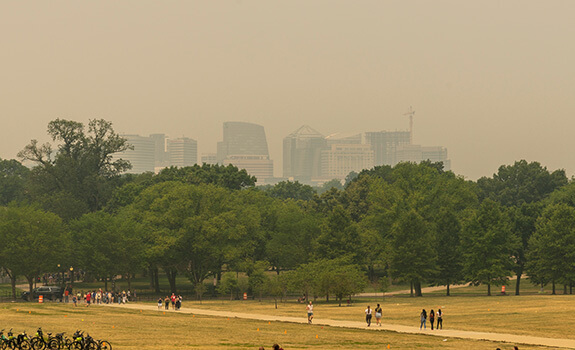News•October 21, 2024
Smoke, Air Pollutants, and Dementia

By Ram Rao, Ph.D., Principal Research Scientist for Apollo Health
Recently, California and other places have witnessed several uncontrollable wildfires. While being in nature and absorbing vitamin D from the sun are perfect and natural solutions for reversing cognitive decline, we need to be mindful of the air we breathe from wildfire smoke and air pollution. More and more studies are shedding light on the profound impact of air pollutants on cognitive health, particularly their link to Alzheimer’s dementia (AD).
Recent research is revealing an increasingly clear link between exposure to wildfire smoke and heightened risks for neurodegenerative diseases, including AD. Studies indicate that long-term exposure to fine particulate matter (PM2.5) and other airborne pollutants like nitrogen dioxide (NO2), carbon monoxide, volatile organic compounds (VOCs), and other toxins contribute to cognitive decline. These pollutants are small enough to enter the bloodstream and trigger AD pathology. People exposed to elevated levels of air pollutants showed a more rapid decline in cognitive function compared to those who did not get exposed or had lower exposure.
Wildfire smoke also contains a high concentration of toxic pollutants, which, upon inhalation, travel deep into the lungs, entering the bloodstream and potentially reaching the brain. Exposure to these pollutants can exacerbate inflammation, which could accelerate the formation of amyloid-beta plaques and tau protein tangles. Furthermore, smoke pollutants trigger oxidative stress, which contributes to the progression of AD by destroying cells and tissue in the brain responsible for memory and learning. The elderly and those with pre-existing cognitive conditions are particularly vulnerable to the effects of air pollution and wildfire smoke as they accelerate the decline in cognitive function. At Apollo Health, we encourage everyone to limit their ongoing exposure to air pollutants that can be harmful to the brain. We have provided many simple steps that one can use as part of a detox technique for our members. For example:
Monitor Air Quality: Use apps and websites to track air quality in your area. Avoid outdoor activities when the air quality is poor.
Use Air Purifiers: Investing in a good air purifier can help lower indoor pollution levels, creating a safer space for your brain and overall well-being.
Maintain a Clean Indoor Environment: Regularly clean your home to minimize dust and particulate matter, and opt for natural cleaning products to reduce chemical exposure.
Masking: It is always a good idea to use N95 masks or P100 masks when stepping out and avoid air pollution to the furthest extent possible.
While rapid industrialization has been one of the driving forces behind economic growth in many parts of the world, it has also been a major contributor to air pollution. This connection stems from the energy-intensive nature of industrial processes, which often rely on burning fossil fuels like coal, oil, and natural gas. These activities release large amounts of harmful pollutants into the atmosphere. Together with wildfires that have become more frequent and intense due to climate change, the potential public health impact, particularly its effect on AD, is a growing concern. While spending time outdoors is vital for preventing and reversing cognitive decline, it’s important to be mindful of air pollution and wildfire smoke. We can protect our cognitive health by monitoring air quality and choosing the best times to be outside. Understanding the link between environmental pollutants and cognitive health is essential, especially for those of us who are focused on preserving brain health as we age. While more research is still needed to understand the exact mechanisms fully, we can be proactive and take steps to minimize the damage from these air pollutants.




